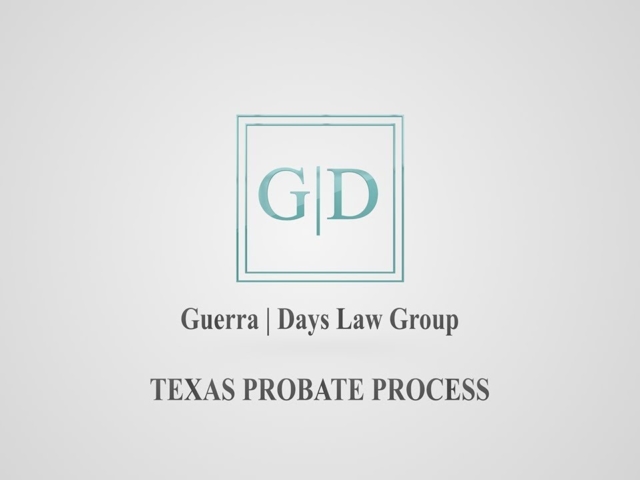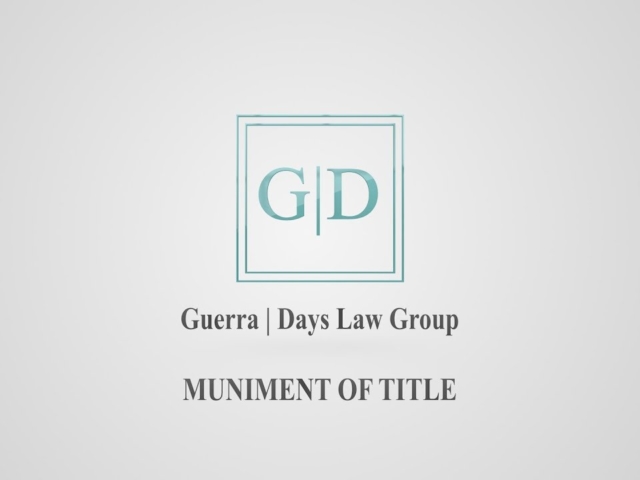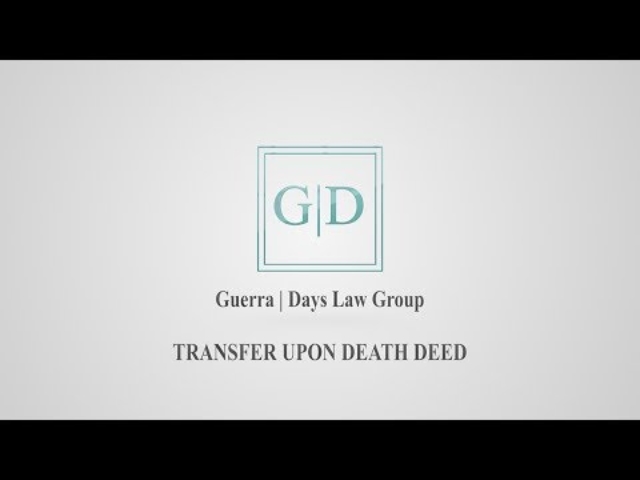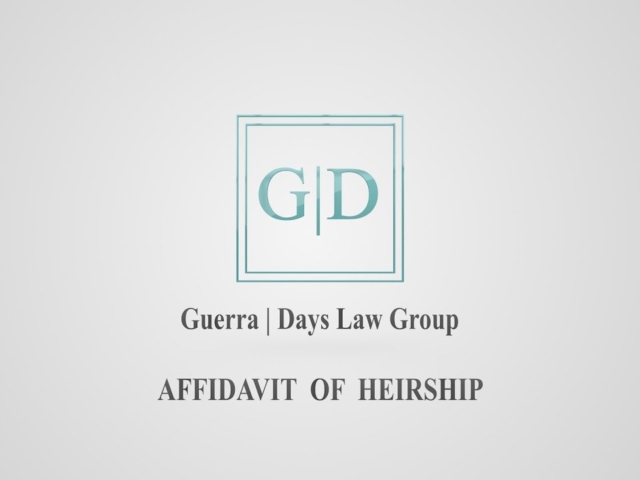Need help settling an Estate, with or without a will?
As Houston’s best Probate Attorneys, we can help!
| Muniment of Title | Small Estate Affidavit |
Right of Survivorship | Payable-on-Death |
| Transfer-on-Death Deed | Will Contest | Intestate v. Testate |
Small Estate |
| Living Trust | Joint Tenancy | Family Law | Owner Financing |
Houston Probate Attorney
When a loved one passes and leaves property or an estate, it can be a difficult for families to understand how to manage the situation. As a probate attorney in Houston, Guerra | Days Law Group understands the pain and sorrow that shadows over the family during this time. Do not worry, an experienced Houston probate attorney from our firm will explain the different options and seek out the best solution for your particular situation.
What does it mean to Probate an Estate?
In Texas, probate is defined as the official proving of a will. A court officially recognizes the death of the loved one and supervises the distribution of the estate.
The Formal Routes to Probate:
Any Houston probate attorney will tell you there are generally two (2) traditional routes to probate, along with a few simpler routes. If a loved one dies with a will, they have died testamentary. If a loved one dies without a will, they have died intestate.
Probate an Estate with a will:
Independent Administration of Estates
If you have a loved one who has died testamentary, with a will, the deceased loved one (decedent) will name an Executor, chosen for the distribution of the estate. The executor is responsible to notify creditors and pay off all debts attached to the estate before the final distribution.
Texas Muniment of Title
A Houston probate attorney from our firm will recommend using a muniment of title, should you qualify, to avoid the probate process entirely. The Texas muniment of title allows a document, such as a last will and testament, to be used as proof of title for the estate instead of going through the entire probate process. Once you have the Texas muniment of title, you must submit the last will and testament into probate as muniment (evidence) to the assets of the estate. In such cases, an administrator is not required to be appointed, however, the one submitting the Texas muniment of title to the probate court has the duty to report back within six (6) months, confirming the terms of the will were in fact carried out.
Probating a will as a muniment of title in Texas is best used for property which are small, straightforward, and when the decedent’s only transferable asset is a home. A Houston probate attorney will not advise probating a will as a muniment of title in Texas if the beneficiaries do not get along, or if there are significant assets in the estate.
You can use the Texas muniment of title in probate court if:
- The decedent left a last will and testament in place
- The decedent’s estate does not have any debts attached (except secured real estate)
- Medicaid does not have any claims to make against the estate
- The last will and testament was presented in a Texas probate court within four (4) years of the decedent’s death
Consult an experienced Houston probate attorney to see if you can qualify for a muniment of title.
Probate an Estate without a will:
Dependent Administration of Estates
If you have a loved one who died intestate, without a will, a probate court will appoint an Administrator to the decedent’s estate. The administrator is typically a spouse or an heir of the decedent and once granted permission by the court, the elected administrator will become the legal representative of the estate. This administrator would act as an executor and will be responsible for the distribution of the property.
Texas Small Estate Affidavit – no probate procedure required
A piece of property is considered a small estate if the value of the property is $75,000 or less. A Houston probate attorney will recommend filing a small estate affidavit to avoid the probate procedure.
To file a small estate affidavit with a Houston Probate attorney, there must be:
- No official last will and testament in place
- The value of the decedent’s estate is valued at $75,000 or less
Texas Affidavit of Heirship – no probate procedure required
If the estate of the deceased loved one primarily consists of real property titled in the decedent’s name, a probate attorney from our firm will recommend filing an affidavit of heirship to avoid the probate procedure.
To file an affidavit of heirship with a Houston probate attorney, there must be:
- No official last will and testament in place
- An estate primarily of real property titled in the name of the decedent
Do I have to go through Probate court?
A Houston probate attorney will inform you about the several routes in which the decedent’s estate is not subject to probating. In these situations, the assets will transfer automatically upon the death of the decedent.
Here are the different scenarios to avoid probate in Texas:
- If property considered a “Small Estate”
- Transfer on Death Deed (TODD)
- Joint Tenancy
- Tenancy by the entirety or Community property with Right of Survivorship
- Beneficiary Designations
- Living Trust in place
A Houston probate attorney from our firm will help you determine if you qualify to avoid probate and guide you through the details of each possible route.
Potential Issues in Texas Probate
There are many obstacles that can prevent the Texas probate process from being completed. The following are some of the challenges that an Executor or Administrator may face when trying to probate the decedent’s estate:
- Probate Bond – A probate bond’s purpose is to protect heirs and creditors from being harmed by the negligence or wrongdoing of the administrator or executor. If the bond set by the court is too high it can pose a problem probating the estate.
- Contesting the Administrator – If a party does not agree that the person applying to be the administrator is a suitable candidate, a party can contest the appointment of the administrator by the court. This poses obvious problems to complete the probate process.
- Contesting the Validity of the Will – If a party believes that the executed Will was either unauthentic or executed through coercion or distress, this can invalidate a Will and pose obvious challenges.
- Creditor Challenges – Probate is not just about assets but also about liabilities of the estate. The administrator or executor must give a notice to creditors. The creditor can challenge amounts owed to them and that can delay or even prevent the probate from being completed
- Disputes between heirs – This is one of the most common pitfalls of probate. It is not uncommon for families to have disputes amongst themselves. In cases where the heirs cannot agree, real property is sometimes court ordered to be sold and the proceeds distributed amongst the heirs. There are also tenant issues for family members that occupy the property at the time the loved one passed. This can further complicate the Texas probate process and that’s why having a probate attorney on your side will ease any issues that arise.
- General probate litigation – With all these potential pitfalls and others not mentioned, it is not uncommon for the general legal process to take a toll on the Texas probate process. In some cases, this is used to force parties to come to a settlement.
Any of these challenges can prolong the probate process in Texas or even prevent the probate process from being finalized, so you should contact a Houston probate attorney at Guerra | Days Law Group and we will assist you.
Houston Probate Caveats
j
j
j
j
j
j
j
j
j
j
j
j
j
j
j
j
j
j
j
j
j
j
j
j
j
j
j
j
j
j
j
j
j
j
j
j
j
j
j
j
j
j
j
j
j
j
j
j
j
j
j
j
j
j
j
j
j
Video Gallery





